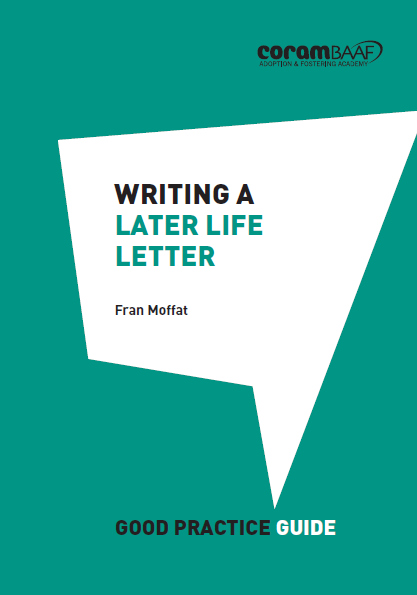
Writing a later life letter
£10.95
A later life letter is one written by a social worker to a child who is being adopted, to help the child make sense of their past, but it is intended to be read later in the child’s life. This is a difficult and delicate task. How do you write to a young person who may not remember you? How do you explain painful events in the young person’s childhood? What is the role of the adoptive parents in the writing and use of the letter?
This Good Practice Guide focuses on the practicalities of writing a later life letter.
Who is this book for?
All practitioners and managers involved in writing later life letters, or in ensuring that agency policy and practice properly support and enable their writing and use.
What you will find in this book
The guide includes information on:
- what should and should not be included in a later life letter
- how to explain difficult or painful issues, such as abuse, death of a birth parent and disruption
- the importance of tone and language used
- the place of the letter within life story work
- involving the adopters in writing the letter and explaining how best to share it with their child
Examples of text from later life letters help to illustrate and clarify the guide’s practical advice, and a range of helpful appendices and supplements are also provided.
Read the contents page and introduction
Author
Fran Moffat worked as a Trainer Consultant with BAAF Southern England for 11 years. She currently undertakes consultancy work and acts as an independent chair of an adoption panel.
Download the guide for adoptive parents on how to use a later life letter here.
NOW AVAILABLE IN EBOOK AND HARD COPY
This title is now available in digital-only format for immediate access. Purchases are held in your own personalised online library and accessed via your browser or through the app on your phone or tablet.
Questions about eBooks? Check out our FAQs£10.95
Reviews
The book is detailed and it covers a great deal of information which I found relevant and important. I would recommend this book to all social workers, adoption social workers and any other professional, adoptive and foster carers who are involved in conveying information in the form of the later life letter (to the child/young person) to make sense of their past in a measured, sensitive and considered manner.
Dr Rukhsana Farooqi, Independent Social Work Consultant, Director of Empowering Black Children and Families Ltd
